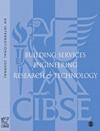Potential carbon emissions reduction related to the recovery of unutilised waste heat
IF 1.8
4区 工程技术
Q3 CONSTRUCTION & BUILDING TECHNOLOGY
Building Services Engineering Research & Technology
Pub Date : 2021-05-01
DOI:10.1177/0143624420986279
引用次数: 0
Abstract
The introduction of district heating will have a significant impact on the building services industry, from the architecture of a building to its operation. This technical note investigates a delimited portion of the potential of currently unutilised heat which has the possibility to supply district heating networks in the UK. The UK industrial sector, wastewater treatment facilities and the existing UK waste incineration plants all produce waste heat available in a temperature range suitable for extraction into district heating networks via commercialised techniques broadly used in other countries. This technical note presents a comparative literature review, comparing UK statistics and studies with performance data based on Swedish operational facilities. It finds 51.7TWh of currently unutilised heat could be recovered annually, with a significant associated emission decrease if incorporated into the heat supply of the UK building stock. A quantitative analysis is carried out to compare the identified potential with the current UK heat demand and the potential impact on the UK carbon emissions is estimated. The calculations indicate a reduction of 14% in the required UK total domestic heat supply, despite only including a limited fraction of the available waste heat potential. Practical application: This technical note serves to highlight and emphasise the large amount of available waste heat potential currently not utilised in the UK. By estimating the impact of waste heat utilisation and incorporation into district heating and heat networks in the UK, the technical note aims to fuel discussion around the further incorporation of waste heat to be utilised in the UK heat sector.与回收未利用废热有关的潜在碳排放减少
区域供热的引入将对建筑服务行业产生重大影响,从建筑物的结构到其运营。本技术说明调查了目前未利用的热能潜力的划定部分,这些热能有可能供应英国的区域供热网络。英国工业部门,废水处理设施和现有的英国垃圾焚烧厂都产生废热,其温度范围适合通过在其他国家广泛使用的商业化技术提取到区域供热网络。本技术说明提供了一份比较文献综述,将英国的统计数据和研究与基于瑞典运营设施的性能数据进行比较。研究发现,如果将目前未利用的51.7太瓦时的热量纳入英国建筑库存的供热,每年可以回收这些热量,并显著减少相关的排放。进行了定量分析,将确定的潜力与当前英国的热需求进行比较,并估计对英国碳排放的潜在影响。计算表明,尽管只包括可用废热潜力的有限部分,但所需的英国国内总供热减少了14%。实际应用:本技术说明旨在突出和强调目前在英国未利用的大量可用废热潜力。通过估计余热利用和纳入英国区域供热和热网的影响,技术说明旨在推动围绕进一步纳入余热在英国供热部门利用的讨论。
本文章由计算机程序翻译,如有差异,请以英文原文为准。
求助全文
约1分钟内获得全文
求助全文
来源期刊

Building Services Engineering Research & Technology
工程技术-结构与建筑技术
CiteScore
4.30
自引率
5.90%
发文量
38
审稿时长
>12 weeks
期刊介绍:
Building Services Engineering Research & Technology is one of the foremost, international peer reviewed journals that publishes the highest quality original research relevant to today’s Built Environment. Published in conjunction with CIBSE, this impressive journal reports on the latest research providing you with an invaluable guide to recent developments in the field.
 求助内容:
求助内容: 应助结果提醒方式:
应助结果提醒方式:


